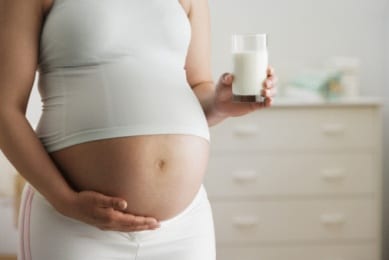Since a developing baby depends on his mother’s diet for all of his nutritional needs, the expectant mother must eat a nourishing diet to support healthy growth and development of her baby. Protein is one of several essential nutritional requirements during pregnancy because it provides the amino acids needed for adequate bone and muscle development. Eating enough protein is essential for healthy development of new cells in the placenta and maternal tissues and encourages healthy blood production. Protein consumption during pregnancy has also been linked to a lower the risk of neonatal death and the occurrence of certain birth defects.
Consequences of a Lack of Protein
A lack of protein in an expectant mother’s diet can lead to a number of health problems in both the mother and the developing baby. A protein deficient diet during pregnancy can make the expectant mother feel weak or light-headed and make it difficult to manage day-to-day tasks without feeling tired or fatigued. For the developing baby, the effects of a lack of protein in the diet include poor muscle and joint development, poor bone development, muscle or bone deformities, miscarriage, brain damage and a high risk of birth defects.
Healthy Sources of Protein During Pregnancy
Experts encourage expectant mothers to eat a minimum of 70 grams of protein per day, and this can be derived from several sources. Foods that contain a significant amount of protein and can be eaten as part of a well-balanced diet include salmon, poultry, egg whites, peanut butter, soy butter, tofu, soy milk, beans, legumes and other lean meats. Protein shakes and protein bars are nutritional supplements that may help some women meet their minimum protein requirements. These can be made from milk products or soy products and be eaten as snacks or as a small meal replacement.
Protein That Can Be Harmful for a Developing Baby
Some types of protein should be avoided to reduce the risk of miscarriage and birth defects. Avoid these food throughout pregnancy and during lactation: soft, unpasteurized cheese; raw fish; shark, swordfish and other types of fish with high levels of mercury; unpasteurized milk; and processed meat such as deli-style meat. While these foods are high in protein, they are also prone to developing bacteria, which can lead to several food-borne illnesses. They are best avoided throughout pregnancy and during recovery.
About the Author
Sabah Karimi is an experienced freelance writer who enjoys writing about lifestyle, parenting, and childhood education topics. Sabah runs a web copywriting and marketing consultancy business in Orlando, Florida.





